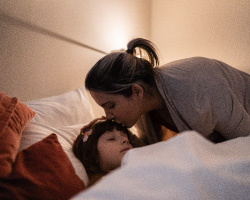 There comes a time when it's every parent's job to check under the bed for monsters. It's normal for kids to be afraid sometimes. As a parent, you can offer comfort. But you can also help your child learn to manage fears so they become confident monster fighters all on their own.
There comes a time when it's every parent's job to check under the bed for monsters. It's normal for kids to be afraid sometimes. As a parent, you can offer comfort. But you can also help your child learn to manage fears so they become confident monster fighters all on their own.
Building skills one fright at a time
The next time your kiddo thinks there's something in the closet, think of it as a chance to help your child learn to work through fear—with just enough help from you. In time, your child will learn to do that even when you're not there!
Managing fears helps kids in important ways as they grow. It helps them to:
- Cope with difficult emotions.
- Build confidence and a sense of control.
Here are some tips from experts for helping your child manage fears on their own:
Help your child talk about it. Kids often need help putting words to their fears. To help, try asking questions like, "What scared you?" or "What makes the thunder scary?"
Acknowledge the fear. That tiny bug might not seem scary to you, but it terrifies your child. As grownups, sometimes we have to remember that. Let your child know that their feelings are real and important to you. You might offer a hug too. But it's best not to focus too long on soothing your child. It can make the fear harder to overcome. Instead, you can say, "I'll help you learn to be brave on your own."
Gradually boost confidence. If you usually have to stay in your child's room until they fall asleep, try cutting back on your role a little at a time. For example, read one or two bedtime stories instead of three. Turn out the lights, but leave a nightlight on. Stay right outside the door instead of right by their side.
Praise your child for being brave. For a confidence boost, give a hug and a "Way to go!" when they face a fear.
Keep trying. It takes time to overcome typical fears like fear of the dark or fear of dogs. But in time, most kids do. If you think your child has an unusual fear, you might want to ask the doctor for more advice. Signs of a potential problem can include:
- Expressing fear of something often or even when it is not around.
- Fears that interfere with daily activities and enjoying life.
- Very strong fears that don't go away.
A word about separation anxiety
Some youngsters can develop a fear of not being by your side. They might be too scared to go to day care or other places without you. Sound familiar? Check out these tips to ease your toddler's separation anxiety.
Source: American Academy of Pediatrics; Child Mind Institute
Reviewed 9/17/2024